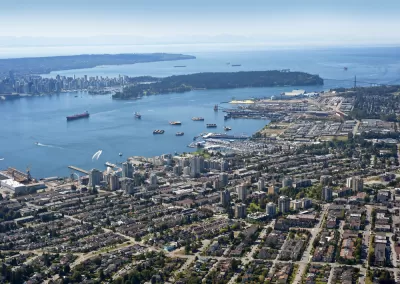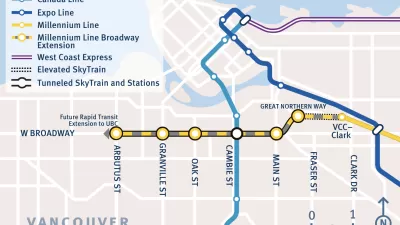A 12-story residential tower proposed for a Vancouver neighborhood is receiving pushback from housing advocates and the local Chinese community.

A 128-unit residential tower proposed in Vancouver's Downtown Eastside neighborhood is stoking fears in some residents that their neighborhood is about to get a lot more expensive. The Province's Nick Eagland reports that 60 percent of the tower’s units would be "social housing," with the remainder at market rate. However, the Carnegie Community Action Project (CCAP) argues that the below market rate prices won’t meet the demand of the neighborhood’s residents.
CCAP’s Jean Swanson, a veteran housing activist, said a requirement for only one-third of the non-market units to be rented at the CAN$ 375 shelter rate — equating to 20 per cent of the overall number of units — does little to help all those struggling on a CAN$ 610 welfare cheque.
“They aren’t good enough because what we desperately need in the Downtown Eastside is housing for homeless people and housing for people who live in the SROs,” Swanson said.
The tower will take over a parcel developed with multiple retail businesses, most of them primarily operated by the local Chinese community, which Eagland reports has caused concern among locals that they will soon be gentrified out.
King-mong Chan, an organizer with the Chinatown Concern Group, said the development will hurt the "essence" and heritage of Chinatown.
“Traditionally, it’s served working-class Chinese people, but now with the development and the gentrification, it’s changing to a more trendy kind of neighbourhood similar to Yaletown,” he said.
The developer, Wall Financial Corp., will be meeting with the community to answer questions prior to going before the city’s Development Permit Board in January.
FULL STORY: Plan for 12-storey residential tower in Vancouver's Downtown Eastside raises gentrification fears

Maui's Vacation Rental Debate Turns Ugly
Verbal attacks, misinformation campaigns and fistfights plague a high-stakes debate to convert thousands of vacation rentals into long-term housing.

Planetizen Federal Action Tracker
A weekly monitor of how Trump’s orders and actions are impacting planners and planning in America.

In Urban Planning, AI Prompting Could be the New Design Thinking
Creativity has long been key to great urban design. What if we see AI as our new creative partner?

King County Supportive Housing Program Offers Hope for Unhoused Residents
The county is taking a ‘Housing First’ approach that prioritizes getting people into housing, then offering wraparound supportive services.

Researchers Use AI to Get Clearer Picture of US Housing
Analysts are using artificial intelligence to supercharge their research by allowing them to comb through data faster. Though these AI tools can be error prone, they save time and housing researchers are optimistic about the future.

Making Shared Micromobility More Inclusive
Cities and shared mobility system operators can do more to include people with disabilities in planning and operations, per a new report.
Urban Design for Planners 1: Software Tools
This six-course series explores essential urban design concepts using open source software and equips planners with the tools they need to participate fully in the urban design process.
Planning for Universal Design
Learn the tools for implementing Universal Design in planning regulations.
planning NEXT
Appalachian Highlands Housing Partners
Mpact (founded as Rail~Volution)
City of Camden Redevelopment Agency
City of Astoria
City of Portland
City of Laramie





























